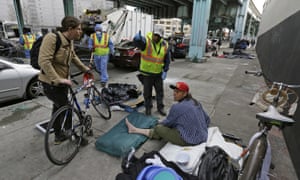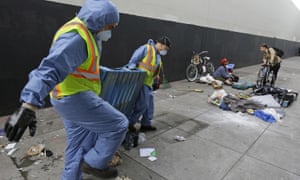
When Jacob Riis published his photographs of late 19th-century urban poverty, he invoked French author François Rabelais’s words: “One half the world does not know how the other half lives.” That ignorance may have been understandable in the age when the poor were sequestered in tenements and slums, but in today’s gentrified cities, the two halves share the frame.
A viral photograph of a young woman in Los Angeles posing for a photograph while a homeless man sleeps on the street at her feet exemplifies the 21st-century urban reality. We see how the other half lives, but we don’t let it distract us from taking our selfies.
According to the 2015 annual homeless assessment performed by the Department of Housing and Urban Development, homelessness in the United States has been declining steadily since 2007. But conditions on the west coast are different.
In 2015, California, Oregon, Washington and Hawaii were four of the five states to see the greatest increase in their homeless populations (the fifth was New York). California alone accounts for 21% of the nation’s homeless population. And while nationwide, 31% of homeless people have some kind of shelter at night, California, Oregon and Hawaii all have unsheltered rates above 50%. In California, 63.7% of the homeless population lacks shelter.
Homelessness on the west coast is increasingly perceived by residents as an unacceptable crisis. In response, policymakers have begun declaring “states of emergency” over the manmade disaster unfolding on their streets.
On Tuesday, San Francisco supervisor David Campos introduced legislation to declare a “shelter emergency” in the city of San Francisco. The move came one week after city officials had cleared out a sprawling homeless encampment under a highway overpass where as many as 300 homeless people had been living in tents and makeshift shelters.

Campos’s legislation seeks to activate a California state law that allows cities to declare a “shelter crisis” when “a significant number of persons are without the ability to obtain shelter, resulting in a threat to their health and safety”. Such a declaration suspends certain liabilities and regulations that would “prevent, hinder, or delay” government action to address the crisis.
“This is usually reserved for natural disasters like floods and earthquakes,” Campos said. “This is not a natural disaster. It’s a manmade disaster, but it’s a disaster nonetheless.”
On the same day, another San Francisco supervisor, Jane Kim, introduced a resolution urging Governor Jerry Brown of California to declare a statewide “state of emergency on homelessness”.
“Homelessness knows no city or county boundaries but is a regional and state-wide issue and only a coordinated response will alleviate this crisis,” the resolution reads.
“We would not ask or expect southern California to deal with the aftermath of a major earthquake alone. We wouldn’t ask the Sierra foothills to address the devastation of a fire alone,” Kim said. “We should not expect any single district or city to solve the homelessness crisis by themselves.”
San Francisco’s push for an emergency declaration follows on similar moves in late 2015 by Los Angeles, Portland, Oregon, Seattle and King County, Washington, and the state of Hawaii. (According to the Los Angeles Times, Mayor Eric Garcetti of Los Angeles ultimately did not officially declare a local state of emergency, choosing instead to appeal to the state for a proclamation from the governor’s office of emergency services, which was denied.)
The cities of San Jose, Oakland, and Eugene, Oregon, have also all declared some kind of shelter crisis related to homelessness in recent months. In December, the mayors of Portland, Seattle, Eugene, San Francisco and Los Angeles convened a new alliance specifically designed to elicit more federal support for the homelessness crisis.
In declaring states of emergency on homelessness, civic leaders have generally noted the incongruity of using a government power that citizens are accustomed to applying to natural disasters.
“Emergency declarations are associated with natural disasters, but the persistent and growing phenomenon of homelessness – here and nationwide – is a human-made crisis just as devastating to thousands as a flood or fire,” said King County executive Dow Constantine.
But according to Jacob Remes, a professor of history specializing in disaster studies, the very concept of a disaster is inherently political, and was never limited to “acts of God” or natural calamities like earthquakes and fires.
“When we do disaster aid, we see people who are made homeless and jobless by a hurricane, and we decide that those people are worthy of a special type of aid. But there are homeless and jobless and poor people all the time who we decide are not worthy of that kind of aid,” Remes argues. “What the category of disaster does is sort people into worthy poor and unworthy poor.”
By declaring states of emergency then, Remes argues that west coast politicians could “create a new population of worthy poor”.
One historical example of this political strategy succeeding is the Great Depression, a manmade disaster during which Remes says politicians deliberately “adopted the language of disaster” by casting the economic catastrophe as “an act of God”.
Declaring an emergency allows people to focus on the conditions in which people are living – universally recognized as deplorable – rather than assigning blame to the people experiencing them, since disasters are generally accepted to be blameless.
“The current situation is the product of slower social and political disasters rather than rapid geological forces,” says Gary Blasi, a UCLA professor of law and expert on homelessness, “but the result is experienced in the same way by homeless people, whatever the cause.”
California has declared emergencies over particularly human catastrophes before, according to Kelly Huston of the governor’s office of emergency services, including urban riots and the San Bernardino shootings. But Huston does not believe that such a declaration has ever been made over homelessness.
The governor’s office declined to comment on the San Francisco resolution, which has not yet been passed by its board of supervisors.
For San Francisco’s Campos, it’s at least worth making the effort. As he introduced his resolution on Tuesday, Campos related the tale of meeting an older homeless woman on the steps of the Navigation Center, a shelter in San Francisco’s trendy and increasingly expensive Mission district.
The woman’s best friend had died on the streets a few days earlier.
“She was camping out on the steps of the Navigation Center because she didn’t want to be next. She was pleading with me to get her in,” Campos said. “We have to do better. What we are doing is simply not enough.”
No comments:
Post a Comment